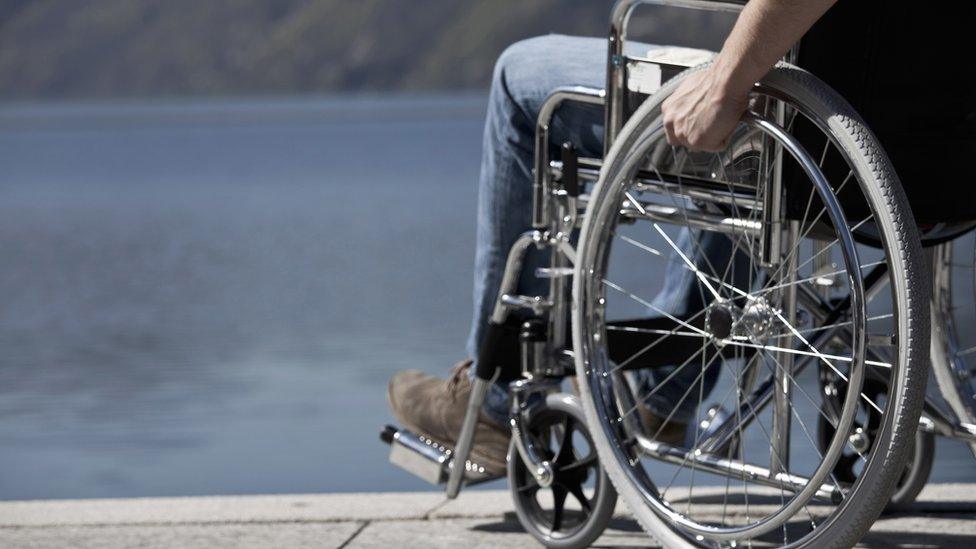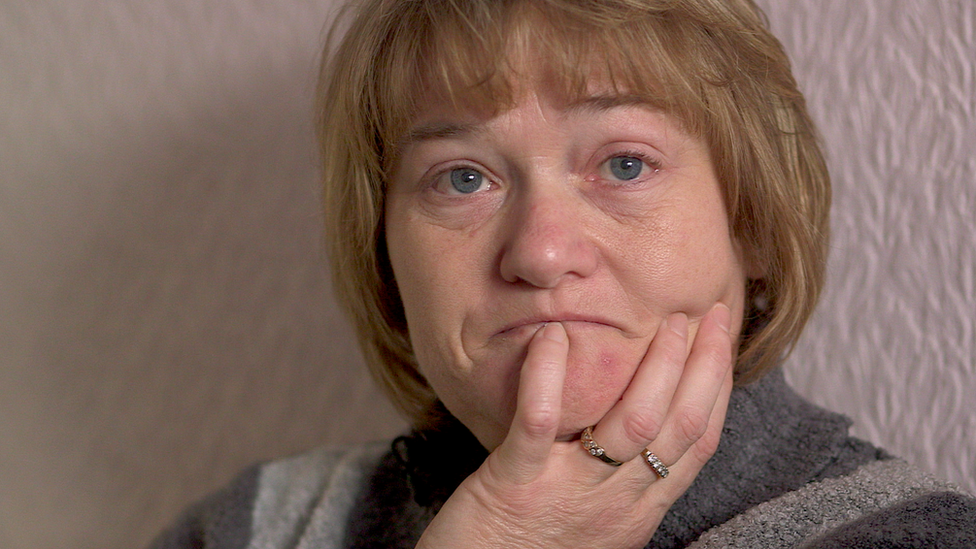Ministers back down in legal battle over disability benefits
- Published

Ministers have backed down in a row over paying higher disability benefits to 164,000 people by saying they will not contest a High Court decision.
Work and Pensions Secretary Esther McVey said she would not appeal December's judgement over payments to people with mental health conditions.
Ministers had sought to limit those suffering psychological distress from claiming higher rates of benefits.
Campaigners said this was "crude and unfair" and welcomed the U-turn.
The government introduced regulations last March stating that people who could not travel independently on the grounds of psychological distress, as opposed to other conditions, were not entitled to the enhanced mobility rate of Personal Independence Payment.
Ministers pressed ahead with the proposals despite criticism from an independent tribunal in 2016 but the High Court ruled shortly before Christmas that they were "blatantly discriminatory".
The government was expected to challenge the ruling, having previously said reversing the changes would cost an extra £3.7bn by 2022.
But Ms McVey, in one of her first major announcements since joining the cabinet last week, ruled out fresh legal action in a written statement to Parliament.
"My department will now take all steps necessary to implement the judgment in the best interests of our claimants, working closely with disabled people and key stakeholders over the coming months," she said, adding that all payments would be backdated to the effective date in each individual claim.
"Although I and my department accept the High Court's judgement, we do not agree with some of the detail contained therein.
"Our intention has always been to deliver the policy intent of the original regulations, as approved by Parliament, and to provide the best support to claimants with mental health conditions."
'Indefensible'
The Department for Work and Pensions will now go through all affected cases to identify anyone who may be entitled to more as a result of the judgement.
All payments will be backdated to the effective date in each individual claim.
Labour's shadow work and pensions secretary Debbie Abrahams said ministers had been wrong to "ignore" the view of an independent tribunal and to try and "defend the indefensible".
"Serious questions remain including, how many people have been adversely affected by the government's reckless decision to oppose the tribunal's original judgment?" she said.
"And how quickly will people with severe mental health conditions receive the support to which they are rightly entitled? This is yet more evidence of the duplicity and disarray of the Tories' social security policies."
Mark Atkinson, chief executive of disability charity Scope, said the original proposals were discriminatory.
"This announcement is a victory for the many disabled people who have been unable to access support they are entitled to. The regulations introduced last March made crude and unfair distinctions between those with physical impairments and mental health conditions," he said.
Today's announcement is about Personal Independence Payments or PIP, a benefit designed to help cover extra costs incurred when you have a disability.

Analysis
By Nikki Fox, BBC disability news correspondent
PIP has two parts, one for help with daily living, the other for mobility. Today's announcement is to do with the latter.
To get the standard rate of £22 per week a person must score eight points at assessment. Scoring 12 points entitles a person to the enhanced rate of £58 per week.
Last February, the government introduced regulations that meant people who struggle to "plan and follow a journey" because of psychological distress would have got a maximum of 10 points. This made it impossible for them to get the enhanced rate unless they get further points elsewhere in the assessment.
Campaigners argued those who could not leave their homes unaccompanied or take public transport incurred extra costs.
Following a legal challenge, the High Court found in December that this was "blatantly discriminatory" and could not be justified.
It has been unclear whether the government would appeal against the decision but Esther McVey has now ruled this out. It means that if a person's condition is deemed severe enough, it's now possible to score 12 points in the assessment and qualify for the enhanced rate of PIP mobility.
- Published25 February 2017

- Published2 May 2017
